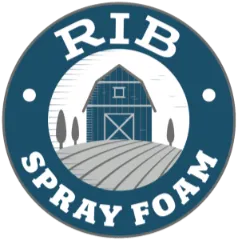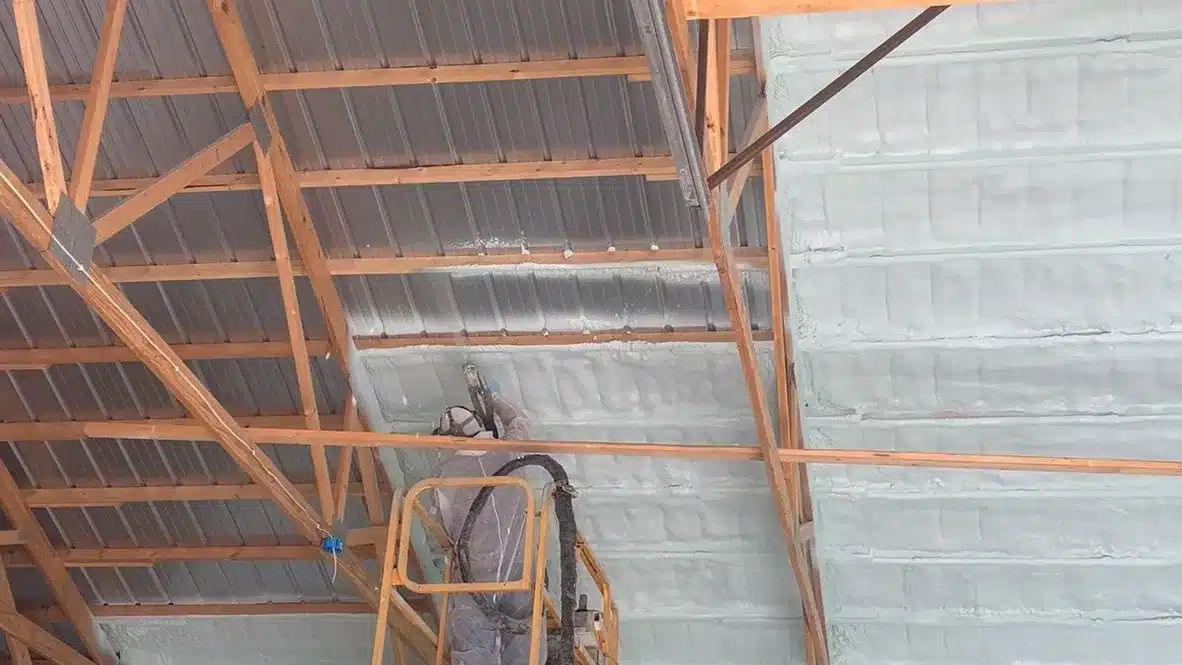If you’re building or upgrading a pole barn in Northern and Eastern Colorado or Southeast Wyoming, choosing the right insulation is key to keeping your barn comfortable, energy-efficient, and cost-effective. Whether you use your pole barn for agricultural storage, livestock, or as a workshop, insulation ensures better climate control, protects against moisture, and improves overall efficiency. Here, we’ll walk you through the best insulation options for your pole barn, with a particular focus on spray foam, which is both versatile and highly effective.
Why Insulate a Pole Barn?
Pole barns are popular for their adaptability and affordability, but without proper insulation, they can face a host of issues, such as temperature fluctuations, condensation, and high energy costs. Insulating your pole barn allows you to:
- Maintain Comfortable Temperatures: Insulation minimizes temperature swings during both hot summers and cold winters.
- Prevent Moisture Problems: Proper insulation prevents condensation, which can lead to mold and structural damage.
- Reduce Energy Costs: If your pole barn is heated or cooled, insulation greatly reduces energy consumption.
- Increase Versatility: A well-insulated barn can be used for a wider variety of purposes, including as a workspace or hobby shop.
Now that we understand why insulation is important, let’s explore the best options for insulating a pole barn.
Top Insulation Options for a Pole Barn
1. Closed Cell Spray Foam Insulation
Overview
Closed cell spray foam insulation is a top-tier option for pole barns, offering a seamless air barrier and excellent R-value. Spray foam insulation is sprayed directly onto the walls and ceiling, where it expands and fills every crack and crevice, providing a durable, moisture-resistant seal.
Key Benefits
- High R-Value: Closed cell spray foam offers one of the highest R-values per inch of insulation (typically around R-6 to R-7 per inch), which makes it highly effective for reducing heat transfer.
- Moisture Barrier: Closed cell foam provides a strong moisture barrier, helping to prevent condensation and moisture damage, which is a common problem in uninsulated pole barns.
- Structural Reinforcement: Because closed cell foam hardens after application, it can add structural strength to the walls of your pole barn, making it more durable.
Best Uses
This type of insulation is ideal for pole barns used for agricultural storage, livestock housing, or workshops where climate control and moisture resistance are essential.
2. Fiberglass Batt Insulation
Overview
Fiberglass batts are another popular choice for pole barn insulation due to their affordability and ease of installation. Fiberglass insulation comes in rolls or pre-cut panels and is typically installed between the framing studs of the pole barn.
Key Benefits
- Affordable: Fiberglass is one of the most cost-effective insulation materials, which makes it attractive for budget-conscious projects.
- Readily Available: This insulation is easy to source and can be installed by DIYers or professionals alike.
- Basic Thermal Protection: Fiberglass batts provide decent thermal resistance and can help reduce energy costs.
Drawbacks
- Not Air-Tight: Unlike spray foam, fiberglass batts don’t provide an air-tight barrier, which may allow for drafts and energy loss.
- Moisture Issues: Fiberglass is susceptible to absorbing moisture, which can lead to mold and mildew problems if not properly protected from condensation.
Best Uses
Fiberglass batts work well for pole barns that don’t require perfect air sealing or that are located in areas with lower humidity. It’s a good option if budget is a key concern.
3. Rigid Foam Board Insulation
Overview
Rigid foam boards are made of materials like polyisocyanurate, polystyrene, or polyurethane. These boards are installed on the walls and ceiling of a pole barn to add insulation with a high R-value.
Key Benefits
- High R-Value: Foam board insulation has a high R-value, usually around R-5 to R-6 per inch, which makes it an effective thermal barrier.
- Easy to Install: Foam boards can be easily cut to size and placed between the framing, providing an efficient installation process.
- Moisture Resistance: These boards are resistant to water and don’t absorb moisture, making them useful in preventing condensation issues.
Drawbacks
- Gaps and Seams: Foam board must be carefully installed, as any gaps between boards can lead to air leaks. Proper sealing with tape or caulk is necessary to ensure effectiveness.
- Cost: Rigid foam board is generally more expensive than fiberglass batts, though not as costly as spray foam.
Best Uses
Rigid foam board is well-suited for workshops or hobby spaces where maintaining a steady temperature is important, but complete air sealing is not as critical.
Closed Cell Spray Foam: The Optimal Choice for Pole Barns
When considering all of the above insulation options, closed cell spray foam consistently stands out as the most effective solution for pole barns. Spray foam insulation provides a combination of high R-value, excellent air sealing, and superior moisture resistance that is hard to match with other materials.
Key Reasons to Choose Closed Cell Spray Foam
- Complete Air Seal: Unlike fiberglass or foam board, spray foam expands to fill every nook and cranny, which means no drafts, no leaks, and better energy efficiency.
- Superior Moisture Control: The ability of closed cell foam to act as both an insulator and a vapor barrier makes it the ideal choice for pole barns in regions with fluctuating humidity levels, such as Northern Colorado and Wyoming.
- Energy Savings: By eliminating air leaks and providing a higher R-value, spray foam reduces energy costs significantly, keeping heating and cooling expenses low.
- Longevity: Once installed, spray foam insulation lasts for decades without the need for maintenance or replacement, making it a cost-effective investment in the long run.
At RIB Spray Foam, we specialize in pole barn insulation using high-quality closed cell spray foam. We understand the unique challenges presented by the climate in Northern and Eastern Colorado, as well as Southeast Wyoming, and we are here to provide insulation solutions that are built to last.
How to Choose the Right Insulation for Your Pole Barn
Choosing the right insulation depends on how you plan to use your pole barn, your budget, and your climate conditions. Here are some considerations to help you decide:
- Usage: If you plan to use your pole barn for livestock or equipment storage, you’ll want insulation that provides good temperature regulation and moisture control. Spray foam is ideal for this.
- Budget: Fiberglass batts are the most budget-friendly but lack the efficiency and moisture control that spray foam provides.
- Climate: If your pole barn is in an area with significant temperature swings or high humidity, closed cell spray foam will offer the best performance, as it effectively prevents condensation and maintains a stable indoor climate.
RIB Spray Foam: Insulation Solutions You Can Trust
If you’re ready to insulate your pole barn, RIB Spray Foam is here to help. We specialize in closed cell spray foam insulation for pole barns, residential properties, and new construction. Our team is committed to providing the best solutions to meet the needs of our customers in Northern and Eastern Colorado and Southeast Wyoming.
Contact us today for a consultation to see how spray foam insulation can enhance your pole barn’s energy efficiency and indoor comfort.
- Call us at (970) 518-2883
- Visit our website at https://ribsprayfoam.com/
- Email us at [email protected]
Our experts are ready to answer any questions you have and provide a customized solution for your insulation needs.
FAQs
1. How much does it cost to insulate a pole barn with spray foam?
Costs can vary, but closed cell spray foam is generally more expensive upfront than fiberglass, though it offers greater savings on energy bills over time.
2. Can I install spray foam insulation myself?
Spray foam installation requires specialized equipment and expertise, so it’s best to hire professionals like RIB Spray Foam.
3. How long does spray foam insulation last?
Closed cell spray foam insulation can last for decades without needing replacement, making it a long-term solution.
4. Is closed cell spray foam safe for livestock?
Yes, once properly cured, closed cell spray foam is safe and can help regulate temperature, keeping livestock comfortable year-round.



